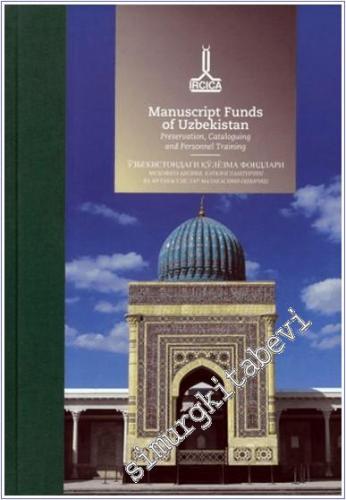#smrgKİTABEVİ Proceedings of the International Workshop Manuscript Funds of Uzbekistan : Preservation Cataloguing and Personnel Training - 2020

Prepared for publication by Prof. Ashirbek Muminov, Otabek Muhammadiyev Sources and Studies on the History of Islamic Civilisation Series no. 46, IRCICA, Istanbul, 2020, xxix, 464 p., June 2019, Samarkand
(Articles in Uzbek, English and Russian)
This is a collection of specialized research papers addressing diverse aspects of the preservation, management and utilization of the funds of manuscripts of Uzbekistan. These funds of manuscripts are the products of scientific, philosophical and literary activities that have taken place in Uzbekistan and its region over the past centuries. They are sources of information for researchers who are working on various aspects of the history of culture of the region. Their conservation, cataloguing and valorization engage a wide range of specializations. The workshop which was organized by IRCICA and Imam Bukhari International Scientific-Research Center (IBISRC) in Samarkand, Uzbekistan in June 2019 aimed at encouraging research work and fostering exchanges of information between relevant expert circles on diverse aspects of the management of the manuscript heritage. The participants were an inter-disciplinary group of scholars and specialists involved with theoretical and practical, scientific and technical aspects of the preservation and treatment of funds of manuscripts. Their papers collected in this book focus on current issues and challenges involved in this field, communicate experiences, recommend best practices, evaluate availability of training facilities, and explore avenues of sectoral and inter-country cooperation.
IRCICA's activities on the history of culture in the Islamic world involve frequent references to collections of Islamic manuscripts, both as sources for research and works of science and scholarship. IRCICA's long-term research program of “Studies on Manuscripts” already bore fruit in various of bibliographies and catalogues of manuscripts compiled with varying regional and/or thematic focuses. These publications facilitate researchers access to collections that carry importance for academic study or as cultural heritage assets. They cover various funds including archives of official, institutional or personal documents and manuscripts authored as works of science or letters. They help the aims of appraising the contents of the collections and raising researchers' awareness of them. Concomitantly, IRCICA gives importance to the question of the management and preservation of the funds. The Samarkand workshop delved into this aspect. It can serve as an example for similar ones that would focus on funds of manuscripts located elsewhere. Its proceedings contained in this book can be useful for the experts in charge of curation and management of collections in different parts of the world. The first chapter of the book, on “Manuscript Funds in Uzbekistan”, contains 17 articles; the second chapter, on “Preservation, Primary Description and Online Cataloguing of Manuscripts” has 18 articles, and the third, on “Prominent Scholars of Uzbekistan: Their Compiling Activities and Manuscript Heritage”, 21 articles.
Prepared for publication by Prof. Ashirbek Muminov, Otabek Muhammadiyev Sources and Studies on the History of Islamic Civilisation Series no. 46, IRCICA, Istanbul, 2020, xxix, 464 p., June 2019, Samarkand
(Articles in Uzbek, English and Russian)
This is a collection of specialized research papers addressing diverse aspects of the preservation, management and utilization of the funds of manuscripts of Uzbekistan. These funds of manuscripts are the products of scientific, philosophical and literary activities that have taken place in Uzbekistan and its region over the past centuries. They are sources of information for researchers who are working on various aspects of the history of culture of the region. Their conservation, cataloguing and valorization engage a wide range of specializations. The workshop which was organized by IRCICA and Imam Bukhari International Scientific-Research Center (IBISRC) in Samarkand, Uzbekistan in June 2019 aimed at encouraging research work and fostering exchanges of information between relevant expert circles on diverse aspects of the management of the manuscript heritage. The participants were an inter-disciplinary group of scholars and specialists involved with theoretical and practical, scientific and technical aspects of the preservation and treatment of funds of manuscripts. Their papers collected in this book focus on current issues and challenges involved in this field, communicate experiences, recommend best practices, evaluate availability of training facilities, and explore avenues of sectoral and inter-country cooperation.
IRCICA's activities on the history of culture in the Islamic world involve frequent references to collections of Islamic manuscripts, both as sources for research and works of science and scholarship. IRCICA's long-term research program of “Studies on Manuscripts” already bore fruit in various of bibliographies and catalogues of manuscripts compiled with varying regional and/or thematic focuses. These publications facilitate researchers access to collections that carry importance for academic study or as cultural heritage assets. They cover various funds including archives of official, institutional or personal documents and manuscripts authored as works of science or letters. They help the aims of appraising the contents of the collections and raising researchers' awareness of them. Concomitantly, IRCICA gives importance to the question of the management and preservation of the funds. The Samarkand workshop delved into this aspect. It can serve as an example for similar ones that would focus on funds of manuscripts located elsewhere. Its proceedings contained in this book can be useful for the experts in charge of curation and management of collections in different parts of the world. The first chapter of the book, on “Manuscript Funds in Uzbekistan”, contains 17 articles; the second chapter, on “Preservation, Primary Description and Online Cataloguing of Manuscripts” has 18 articles, and the third, on “Prominent Scholars of Uzbekistan: Their Compiling Activities and Manuscript Heritage”, 21 articles.





















